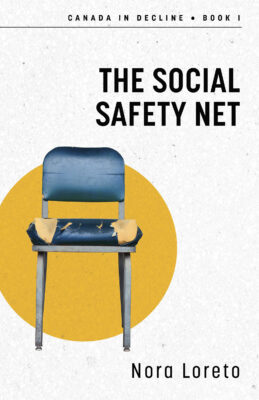If one keeps up closely with local or national news these days, it’s easy to become pessimistic. If one widens that scope to include international current events, that pessimism can easily turn into despair. In Canada, the news cycle reminds us that we face multiple ongoing crises: a housing crisis, a climate crisis, an overdose crisis – the list goes on. In The Social Safety Net, author Nora Loreto offers her prognosis of these intersecting crises facing the country, identifying the boogeyman of neoliberalism as the culprit of our present troubles. The book offers a Canadian primer on this political phenomenon, from neoliberalism’s 1970s roots to present-day ramifications, unpacking how our Canadian variant of Thatcher’s and Reagan’s economic vision has shaped what Loreto sees as a country in decline.

The Social Safety Net
Nora Loreto
Dundurn Press
$25.99
paper
264pp
9781459753105
While giving minor space to Canada’s post-war efforts at building a welfare state, she points out how this once-hopeful vision of Canada was deconstructed over the last four-and-a-half decades. The book takes on the sweeping changes brought in by both Liberal and Conservative governments, showing how neoliberalism came to be in its present form while also calling out the failure of united response by the Canadian left. She fairly criticizes the lack of a substantial response to neoliberalism in the form of a united progressive movement. At the same time, Loreto celebrates the social democratic roots of the Parti Québécois’ policies while brushing past the federal progressive agenda of the New Democrats during the 1970s and ’80s spearheaded by the late Ed Broadbent.
Just as the story of neoliberalism is not a happy one, Loreto’s project doesn’t sugarcoat our recent past. She isn’t interested in cheerleading for Canadian progressives’ occasional victories. Rather, The Social Safety Net is the first book in a series on “Canada in Decline,” which aims to unpack the policies that set this phenomenon as Canada’s political status quo. At the centre of this book is the late Brian Mulroney, who, in Loreto’s words, “bided his time, making small changes here and there.” She presents a deeply researched analysis of these small changes, showing how by the mid-’90s they had snowballed in the leadup to the infamous 1995 federal budget, delivered as it was by a relatively new Liberal government.
The book dives meticulously into reports and scholarship, citing progressive research from the Canadian Centre for Policy Alternatives and a variety of scholarly sources. And while the book could have benefited from direct interviews to support her thorough research, Loreto backs up her claims with heavy-hitting, hard facts, showing how “the neoliberal experiments that started in the 1980s and kicked into overdrive in the 1990s did not achieve what Canadians were told they would achieve.” The country has instead been led into decline in recent decades, she argues, with worsening inequality and compiling crises that beg us to wonder if we progressives deserve the tone of optimism that we so often permit ourselves.
The Social Safety Net reveals Canada’s sharp turn away from social welfare, and serves as essential reading for those curious about our country’s deep infatuation with neoliberalism.mRb






0 Comments